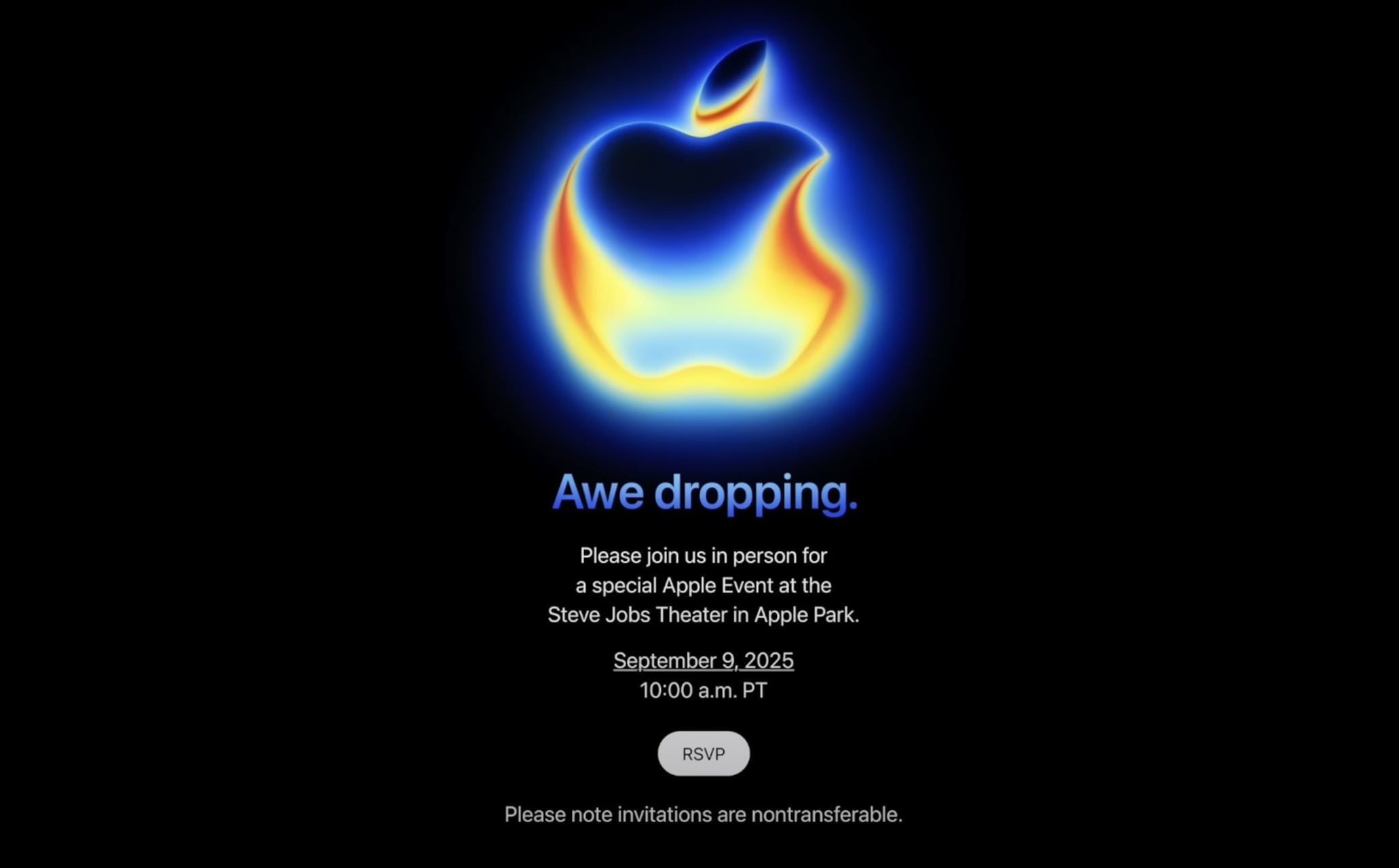Last week, Apple sent out its signature media invites, using their “same but different” template for its annual September event. As always, the Apple logo appeared alongside a tagline, uniquely styled for this year’s event. For the upcoming 9 September (likely iPhone) event, the tagline reads: “Awe Dropping” with an infrared Apple logo. But will it really be awe-dropping—or just another Groundhog Day?
There was a time when Apple’s keynote events felt exciting, inspiring, and unpredictable. These days, Apple events run like Swiss clockwork: impeccably efficient yet as predictable as the sunrise.

Since the iPhone 5 launch in 2012, subsequent iPhone unveilings have consistently occurred in September. The only exception was during the pandemic in 2020, when the iPhone 12 series debuted in October via livestream.
If you’ve been following the rumor mill, you already know what to expect this time around. The event will likely showcase the iPhone 17 lineup, featuring the usual 17, 17 Pro, and 17 Pro Max. There’s even talk of a new iPhone Air—an incredibly thin device rumored to be just 5.5mm thick. Alongside the iPhones, we can expect the Apple Watch Series 11 and possibly the Apple Watch Ultra 3 (considering there were no updates last year). And let’s not forget the potential unveiling of AirPods Pro 3.

You don’t need to be Nostradamus to predict Apple’s September announcements. With incremental upgrades and relentless leaks year after year, the thrill of new iPhones has faded—light-years away from the buzz I felt at my first iPhone launch in 2012. Back then, the excitement was palpable. Even the launch of the Apple Watch in 2015 stirred intrigue, though it eventually settled into the same predictable upgrade cycle as the iPhone.
Last year, Apple introduced the Vision Pro, its take on a virtual reality (VR) headset. While it sparked some hype, it failed to ignite the kind of buzz Apple once commanded. As a luxury product, it was never going to achieve mass adoption.
The truth is, Apple hasn’t redefined or disrupted a product category since the Apple Watch. Yes, there were smartwatches before the Apple Watch, but Apple’s seamless integration of watchOS with iOS made it the gold standard, leaving competitors in the dust. Apple achieved something similar with AirPods in 2016, albeit to a lesser extent. But once again, competitors followed.
Lately, it feels like Apple is playing catch-up. The foldable iPhone remains conspicuously absent, even as Chinese tech companies like Oppo and Honor (see my Honor Magic V5 review) challenge Samsung in this space. The usual argument is that Apple isn’t the first to enter a category—it’s the one that redefines or revolutionises it.
Yet, consider Siri. When it launched in 2011, it was the first widely available virtual assistant on a smartphone, prompting competitors like Microsoft’s Cortana and Amazon’s Alexa to follow suit. Fast forward to today, and Siri—now rebranded as ‘Apple Intelligence’—is stumbling under the weight of its own name. Despite Apple’s partnership with AI poster child OpenAI, Siri remains underwhelming. Advertisements for Siri or Apple Intelligence on the iPhone 16 have quietly faded into the background.
Meanwhile, Google, Meta, and Microsoft are doubling down on artificial intelligence, aggressively hiring AI researchers and experts while aggressively expanding their data centres. Apple, by comparison, seems passive. A New York Times report revealed that Apple’s then CFO Luca Maestri slashed the AI chip budget in 2023, despite CEO Tim Cook’s approval to increase it. Apple later claimed the budget had grown “over time,” but offered no specifics—hardly reassuring in a race where catching up gets harder every day.

Some might argue that Apple is playing the long game, ensuring its AI offerings are better than the competition’s before rolling them out. But if Apple Intelligence was being advertised and then quietly shelved, it suggests something went wrong along the way.
For years, I’ve worn the label of “Apple fanboy”. I’ve been using Apple computers since 1998, back when the world was dominated by Windows. My cupboard is filled with Apple memorabilia (T-shirts, bottles, pens and etc) and some of its old products (my only regret: not buying Apple stock).
I really hope Apple gets its mojo back again. But even as Apple’s financial health has never been better—with record revenue growth—its recent track record is concerning. I hope Tim Cook isn’t following the path of Steve Ballmer, Microsoft’s former CEO, who oversaw incredible growth and profits during his tenure, but missed out on the industry trend towards mobile, search, and cloud computing back then.
As 9 September approaches, I’m holding out hope to drop my jaw in awe and not stifle a yawn in disappointment. Prove me wrong, Apple.
